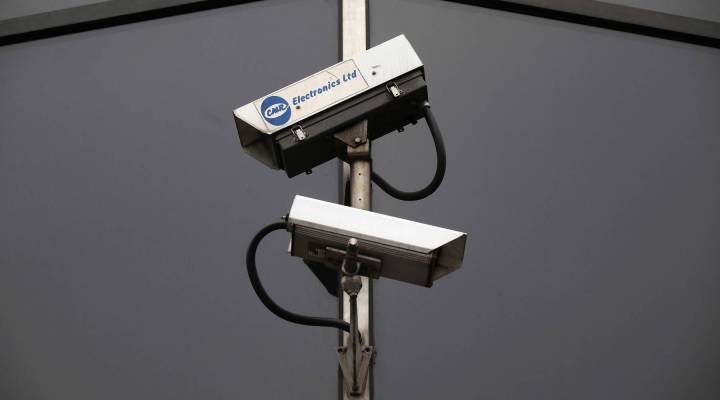
When stores, and credit firms, watch you shop

By now you know that when you shop online, you’re being tracked. The data you hand over with every click helps e-tailers learn more about you. They use that information to do everything from recommend products you might like to tweaking prices. Now the same thing is happening offline, too.
New “smart” security cameras can help stores do a whole lot more than stop shoplifters, says Brian Kiraly. His company, Infusion, just developed one of these cameras with Microsoft.
“What that does is a partial facial recognition. It takes cheeks, chin, eyes and basically gets gender and age,” he said, demonstrating the camera at the National Retail Federation trade show in New York.
The camera records passersby, and a software program sorts them in real time, dividing them up by age category — child, adult or senior — and gender.
Retailers can use this information to decide what to stock, where to put it and where and how to advertise. Brick and mortar stores are hungry for all of the information they can get on their customers. The kind of information online retailers know. So many are trading security cameras in for smart cameras.
“We can actually look at your movements, such as how you go from a merchandise table in the front to a merchandise table in the back,”says Roseanne McCauley, vice president of Experian Footfall, a new business started by the big consumer credit report agencies. It supplies all kinds of foot traffic data to merchants. “Whether you go up the escalator or not. We can also do dwell time: How long did you stay in a specific area.”
McCauley says big retailers like Lacoste, Crabtree and Evelyn and Adidas have used that information to improve sales and, on the whole, have seen customers spend up to 5 percent more in their stores — huge in the slim profit margin retail business. That number could grow as retailers find new ways to step up shopper surveillance.
“The next wave of technology is mobile,” explains McCauley. Experian is teaming up with cell phone companies to take customer tracking to the next level. When you walk into a participating store, your cell phone company will tell Experian who you are, Experian will tap into the vast pool of data it has on you — things like age and credit history. Then, without telling stores who you are, Experian will hand some of that information over to stores.
“There are all sorts of privacy issues around cell phone data, so no one is able to take a cell phone number and bring it to a person,” says McCauley. “But what we can do is profile groups of people and give people a demographic code.”
Experian assigns shoppers one of 60 consumer profiles, such as Dream Weaver, people with six figure salaries and a penchant for tech gadgets, or Struggling City Center, people on tight budgets, who tend to like watching talk shows.

Which consumer profile do you fit? Check out Experian’s breakdowns here.
Experian and Verizon are both piloting programs that could tell retailers even more.
“Through wireless technology, you can get the pattern of the person when they left the house, drove to the mall and the stores they went to,” says McCauley.
We can expect to see retailers doing more and more of this, says Joseph Turow, a professor at the University of Pennsylvania’s Annenberg School For Communication and author of “The Daily You: How The New Advertising Industry Is Defining Your Identity And Your Worth.”
“We are moving into a world where companies are going to judge us by our data,” says Turow. “We will have people being put into what I call reputation silos, which would tell the store, ‘This person is more likely to buy the cheap stuff and here’s the person who buys the premium stuff.'”
If you’re suddenly feeling the urge to wear a ski mask everywhere and ditch your phone, you’re having exactly the reaction retailers are worried about, says digital marketing consultant Will Riegel.
“Every single day, people in data, are concerned about the ‘creep’ factor,” he says.
Riegel says one way to target shoppers without freaking them out is to use loyalty programs, where customers essentially volunteer to have their purchases tracked in exchange for relevant discounts. The next stage would be to embed tracking chips in, say, your Target card.
“When you walk into a store, an in-store advertisement will adjust to say, ‘Hey, you haven’t picked up Tide recently. It’s been over a month. Your clothes getting dirty? Check out aisle number 7,'” explains Riegel.
Of course, that’s at least a few years away.
For now, cameras are just starting to be able to separate boys from girls, which is proving challenging enough. Infusion’s camera thought I was a man until I took my hair out of a bun.
There’s a lot happening in the world. Through it all, Marketplace is here for you.
You rely on Marketplace to break down the world’s events and tell you how it affects you in a fact-based, approachable way. We rely on your financial support to keep making that possible.
Your donation today powers the independent journalism that you rely on. For just $5/month, you can help sustain Marketplace so we can keep reporting on the things that matter to you.


















